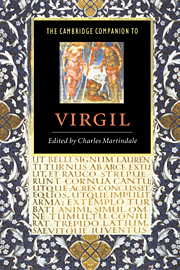Book contents
- Frontmatter
- Contents
- List of illustrations
- List of contributors
- Preface
- 1 Introduction: ‘The classic of all Europe’
- Part 1 Translation and reception
- Part 2 Genre and poetic career
- 8 Green politics: the Eclogues
- 9 Virgilian didaxis: value and meaning in the Georgics
- 10 Virgilian epic
- 11 Closure: the Book of Virgil
- Part 3 Contexts of production
- Part 4 Contents and forms
- Dateline compiled by Genevieve Liveley
- List of works cited
- Index
- Plates
9 - Virgilian didaxis: value and meaning in the Georgics
from Part 2 - Genre and poetic career
Published online by Cambridge University Press: 28 May 2006
- Frontmatter
- Contents
- List of illustrations
- List of contributors
- Preface
- 1 Introduction: ‘The classic of all Europe’
- Part 1 Translation and reception
- Part 2 Genre and poetic career
- 8 Green politics: the Eclogues
- 9 Virgilian didaxis: value and meaning in the Georgics
- 10 Virgilian epic
- 11 Closure: the Book of Virgil
- Part 3 Contexts of production
- Part 4 Contents and forms
- Dateline compiled by Genevieve Liveley
- List of works cited
- Index
- Plates
Summary
Despite the innumerable labours of many critics, Virgil's Georgics remains one of the most fundamentally intractable works of ancient literature. In recent years, most interpreters have agreed that the poem does not really tell us about farming but about ourselves and our world: 'didacticism about agriculture proves metaphor for didacticism about man'. While this consensus may result in part from a modern distaste for and unfamiliarity with agriculture, it has yielded a diversity of compelling interpretations that cannot be wholly explained by changing cultural needs. If we are to understand more fully what this poem does, we need to abandon the interpretive paradigm that seeks some authoritative discursive unity without taking refuge in mere relativism (quot homines, tot sententiae). I would like to argue that the diversity of compelling interpretations is part of the Georgics' larger value and meaning.
We do not need to choose between a poem about dirt and dung and a poem about metaphysics, because this poem addresses the great abstracts (knowledge, history, power, psychology, ethics, art, death) in the way our lives do: by 'contact' with things, by fictions and interpretations, by witty and elegant postures, and ultimately by the failure of projects and systems. The poem captures a double movement: particulars serve as allegories of human problems and values, while allegories are inhabited by things with their particular tasks, objects, and (sometimes colliding) perspectives.
- Type
- Chapter
- Information
- The Cambridge Companion to Virgil , pp. 125 - 144Publisher: Cambridge University PressPrint publication year: 1997
- 11
- Cited by

